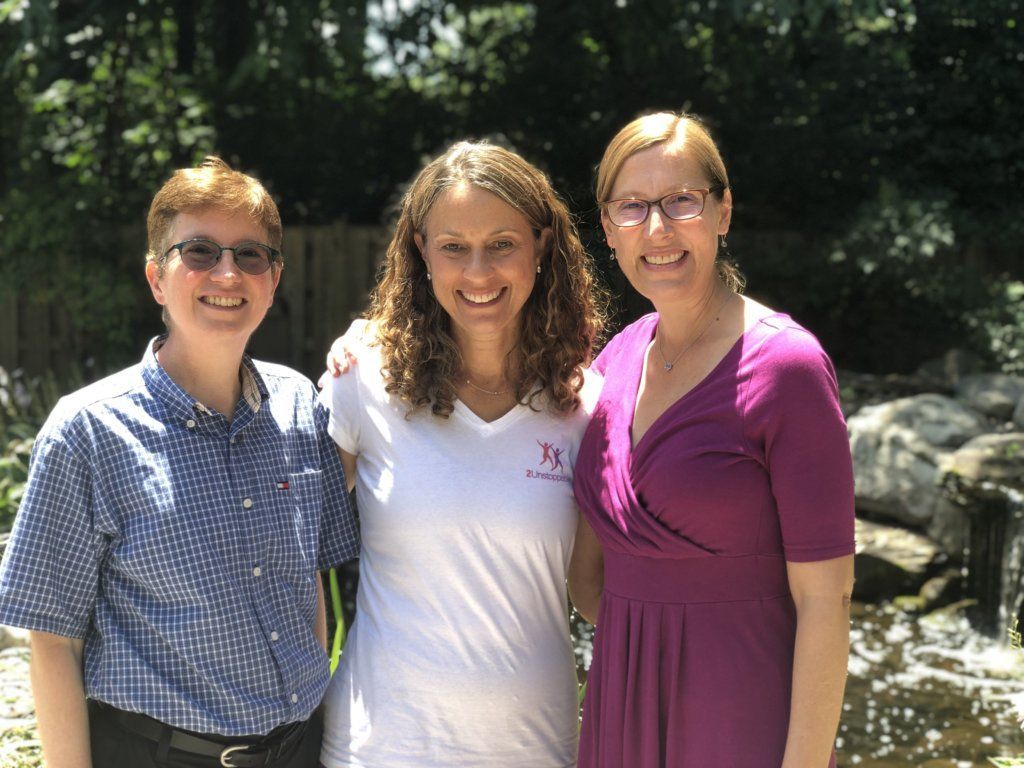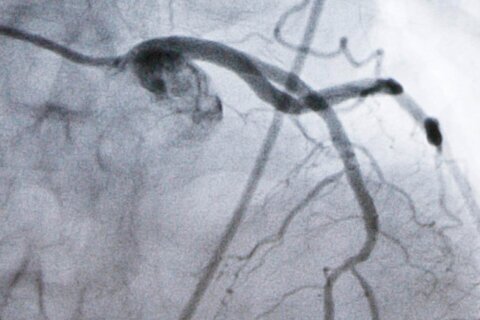Monica Stassen was at the pool with her two small kids when she got the call. Her doctor told her it was breast cancer; she was 43.
“As a mom of young children, that’s immediately where my thoughts went,” said Stassen, a Falls Church, Virginia, resident. “My husband lost his mom to cancer when he was 8, so I was immediately, keenly aware of the potential impacts on the children.”
A few days later, Stassen found herself in the library of what looks like a small mansion at the end of a cul-de-sac in Fairfax, Virginia. She was given a stack of cancer-themed children’s books and set of talking points to explain her new diagnosis to her 6- and 9-year-old. She was also handed a calendar of programming — lectures, support groups, one-on-one counseling, wellness classes and workshops — that she and her family could attend, free of charge.
“From there on, I just kept on coming back, kept doing more programs,” said Stassen, now 45. “And those classes and everything that’s come out of that have been truly life-changing.”
For the last 30 years, Life With Cancer has been providing support to cancer patients, survivors and their families in Northern Virginia by way of individual counseling sessions, educational programs and physical and mental health therapies. Everything is run by a team of more than 40 oncology-certified nurses, therapists and counselors through INOVA, and nearly all of it is free — regardless of where patients receive their cancer treatment.
For Michelle Stravitz, finding her way to Life With Cancer wasn’t easy. Stravitz was “overwhelmed” with information when she was diagnosed with triple negative breast cancer in 2015 at age 48, and she didn’t have the “time or the emotional space” to figure out whether she wanted additional care on top of her aggressive medical treatments.
“Of course, there’s the name Life With Cancer: It’s very hard to swallow the idea that you now have a life with cancer,” said Stravitz, of Fairfax, Virginia.
“It’s a surreal experience to step into an oncologist office; it’s a surreal experience to step into an infusion clinic. It’s also sometimes difficult to step over the threshold of a support organization, knowing that you need this.”

That initial hesitation of seeking support isn’t unusual. Drucilla Brethwaite, director of Life With Cancer, said it’s one reason why the center hosts orientations to introduce patients to all the programs and services offered.
“On many occasions when we just talk a little bit about what we do here, so many times I have gotten this shrug, like, ‘This isn’t so bad,’” Brethwaite said. “It’s hard for people to say, ‘I need this kind of help.’”
The design of the center is intentionally nonclinical. The 16,000-square-foot space, which looks more like a home than a health facility, has a fireplace, a library and a large kitchen, equipped with coffee and a corner table for conversation. There’s an art room for art therapy, a playroom for kids, a deck dotted with rocking chairs and a landscaped garden out back.
“It truly feels like home. I mean, I sort of breathe a sigh of relief when I’m here,” said Stassen, who still utilizes Life With Cancer’s programs three years after her cancer diagnosis.
“It is so welcoming, so warm and is just a place where I feel understood and supported.”
When Stravitz did finally step over Life With Cancer’s threshold, she found yoga classes that were tailored to help participants heal physically and emotionally, plus cardio workouts designed to combat “chemo brain,” a side effect many cancer patients experience after chemotherapy. Stravitz, who now runs her own exercise organization for women with cancer, also found a community where her experiences were the norm, not the exception.
Four years after receiving her diagnosis and undergoing treatment, Stravitz still accesses Life With Cancer’s programs on a regular basis. And she said it’s during these later stages in her cancer journey — “when everybody is ready to wrap cancer up in a box and put in on the self” — that the support has been especially helpful.
“You’re still not only coping with the after effects, but dealing with the fear of recurrence,” Stravitz said.
“[After treatment] and during that survivor mode is when people feel like they’re falling off a cliff or jumping off a cliff and don’t know where to go. Life with Cancer really recognizes that. … We still need a lot of help as we’re navigating this new process.”
Jane Lyons echoes a similar sentiment. Her oncologist suggested Life With Cancer after she was diagnosed with colon cancer in 2015. She finally decided to check it out when she had just finished treatment and was having trouble sleeping.
“You get into this rhythm where you’re actively doing something and then it all stops. And you feel like you’re not doing anything and they tell you [the cancer] can come back at any time,” said Lyons, now 51.
Her cancer did come back, and that’s when she said her emotions “went off the charts,” because she knew, firsthand, the uphill battle ahead. Lyons, who described herself as an anxious person before cancer, said when she started counseling and support groups at Life With Cancer, she started sleeping right away. She also learned mindfulness skills, which she said, “totally transformed” how she feels each day.
“I am a calmer person after getting cancer than I was before,” Lyons said.
“Cancer is overwhelming, and this is highly manageable and it’s highly personalized. You just keep taking small steps forward.”
Sage Bolte, the former executive director of Life With Cancer and current chief philanthropy officer and president of the INOVA Health Foundation, estimates the organization, funded primarily through donations, touches about 15,000 individuals each year through its main center and additional INOVA hospital-based outposts. And while Life With Cancer is currently contained to Northern Virginia, she said it is a model “that would benefit so many communities” across the country.
“When it comes to cancer, you need a team that their only job is to focus on how we help you get physically, mentally and emotionally well so that you can thrive in the midst of your treatment and thrive after your treatment,” Bolte said.
Stassen remembers the first time she sat in a support group at Life With Cancer, and the fear and the “shell shock” that consumed her.
“And I just remember how I was embraced from moment one by the other women who have breast cancer,” she said.
Now, Stassen sees it as her role to support new members of the Life With Cancer community.
“Having cancer changes your life. There are things you lose, but in this case, I felt like I’ve gained so much.”







